“Is that the reasoning of a lover?” she asked me, very quietly. “Is this cold argument, this weighing of issues, consistent with the stormy passion you professed so lately?”
“It is,” I answered stoutly. “It is because I love you more than I love myself that I would have you reflect ere you adventure your life upon such a broken raft as mine. You are Paola Sforza di Santafior, and I—”
“Enough of that,” she interrupted me, rising. She swept towards me, and before I knew it her hands were on my shoulders, her face upturned, and her blue eyes on mine, depriving me of all will and all resistance.
“Lazzaro,” said she, and there was an intensity almost fierce in her low tones, “moments are flying and you stand here reasoning with me, and bidding me weigh what is already weighed for all time. Will you wait until escape is rendered impossible, until we are discovered, before you will decide to save me, and to grasp with both hands this happiness of ours that is not twice offered in a lifetime?”
She was so close to me that I could almost feel the beating of her heart. Some subtle perfume reaching me and combining with the dominion that her eyes seemed to have established over me completed my subjugation. I was as warm wax in her hands. Forgotten were all considerations of rank and station. We were just a man and a woman whose fates were linked irrevocably by love. I stooped suddenly, under the sway of an impulse, I could not resist, and kissed her upturned face, turning almost dizzy in the act. Then I broke from her clasp, and bracing myself for the task to which we stood committed by that kiss—
“Paola,” said I, “we must devise the means to get away. I will bear you to my mother’s home near Biancomonte, that you may dwell there at least until we are wed. But the thing that exercises my mind is how to make our unobserved escape from Pesaro.”
“I have thought of it already,” she informed me quietly.
“You have thought of it?” I cried. “And of what have you thought?”
For answer she stepped back a pace, and drew the cowl of the monk’s habit over her head until her features were lost in the shadows of it. She stood before me now, a diminutive Dominican brother. Her meaning was clear to me at once. With a cry of gladness I turned to the drawer whence I had taken the habit in which she was arrayed, and selecting another one I hastily donned it above the garments that I wore.
No sooner was it done than I caught her by the arm.
“Come, Madonna,” I bade her in an urgent voice. At the first step she stumbled. The habit was so long that it cumbered her feet. But that was a difficulty soon conquered. With my dagger I cut a piece from the skirt of it, enough to leave her freedom of movement; and, that accomplished, we set out.
We crossed the church swiftly and silently, and a moment I left her in the porch whilst I surveyed the street. All was quiet. Pesaro still slept, and it must have wanted some two hours or more to the dawn.




